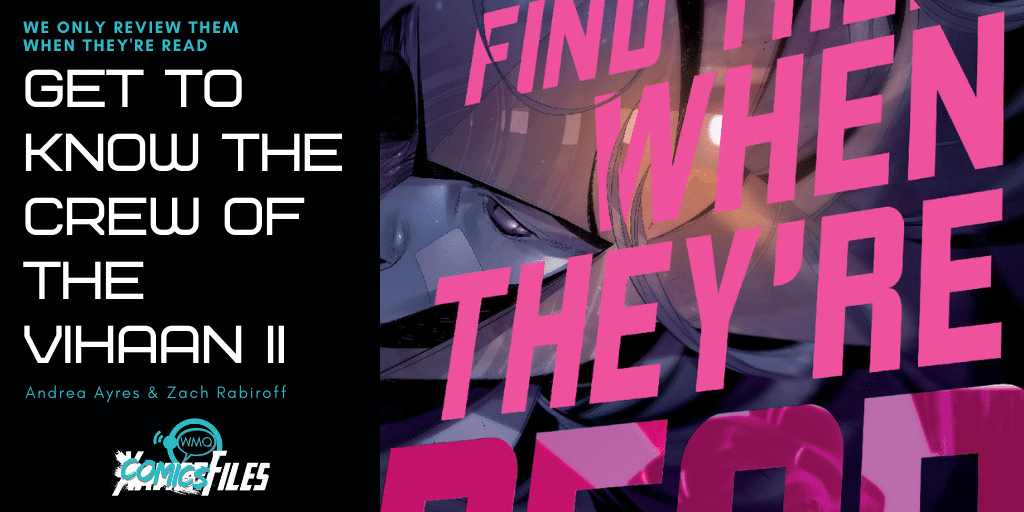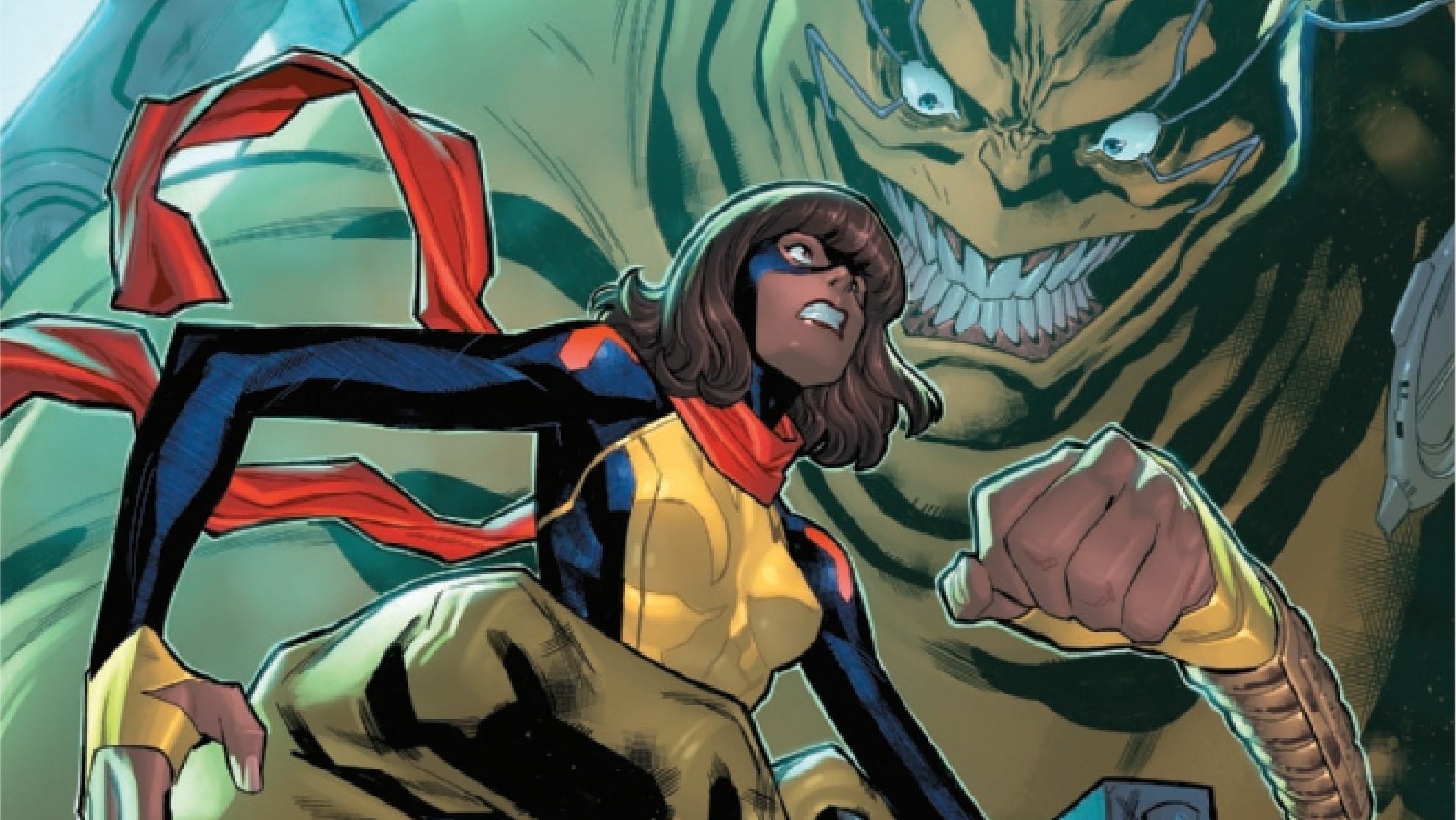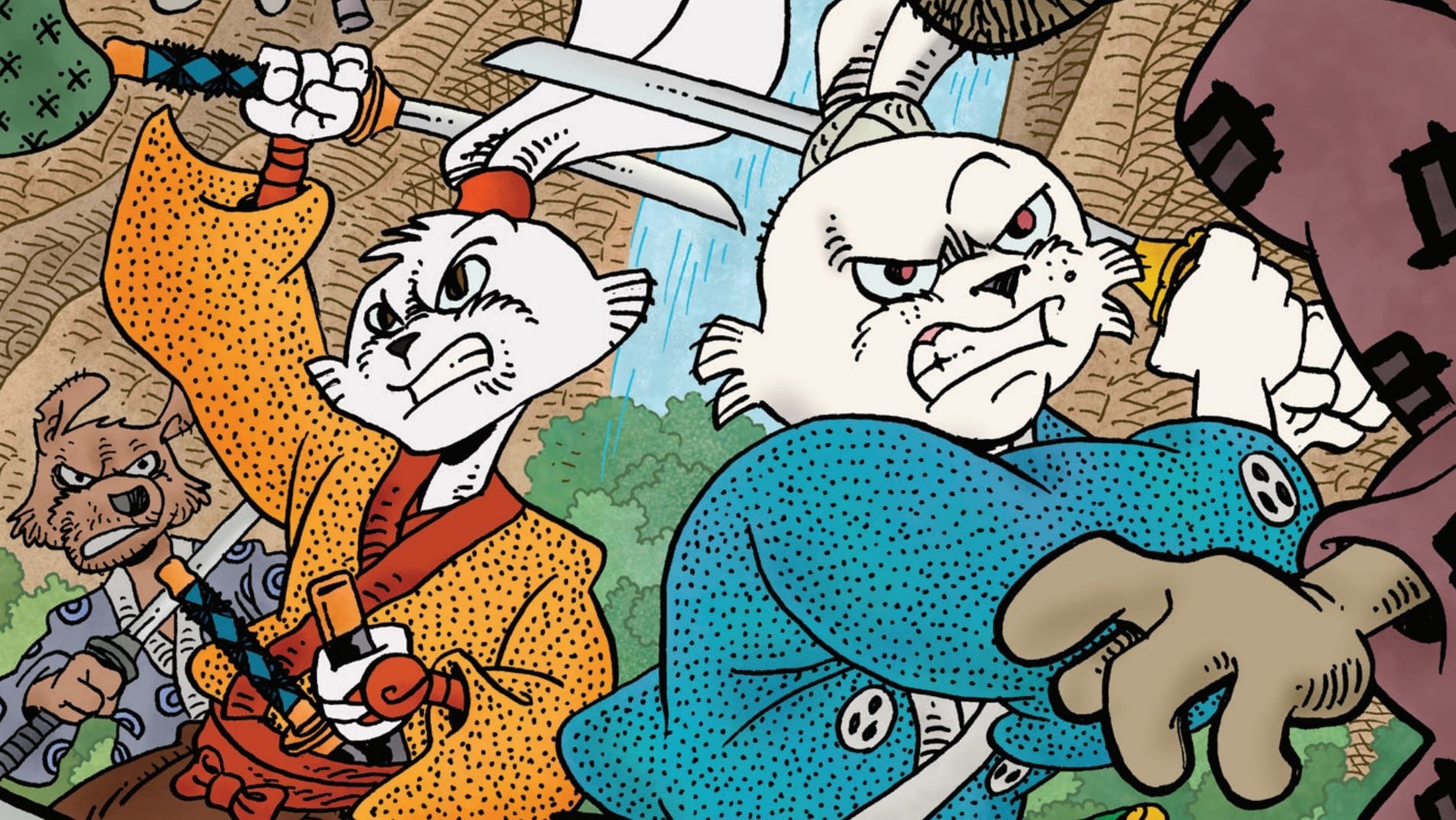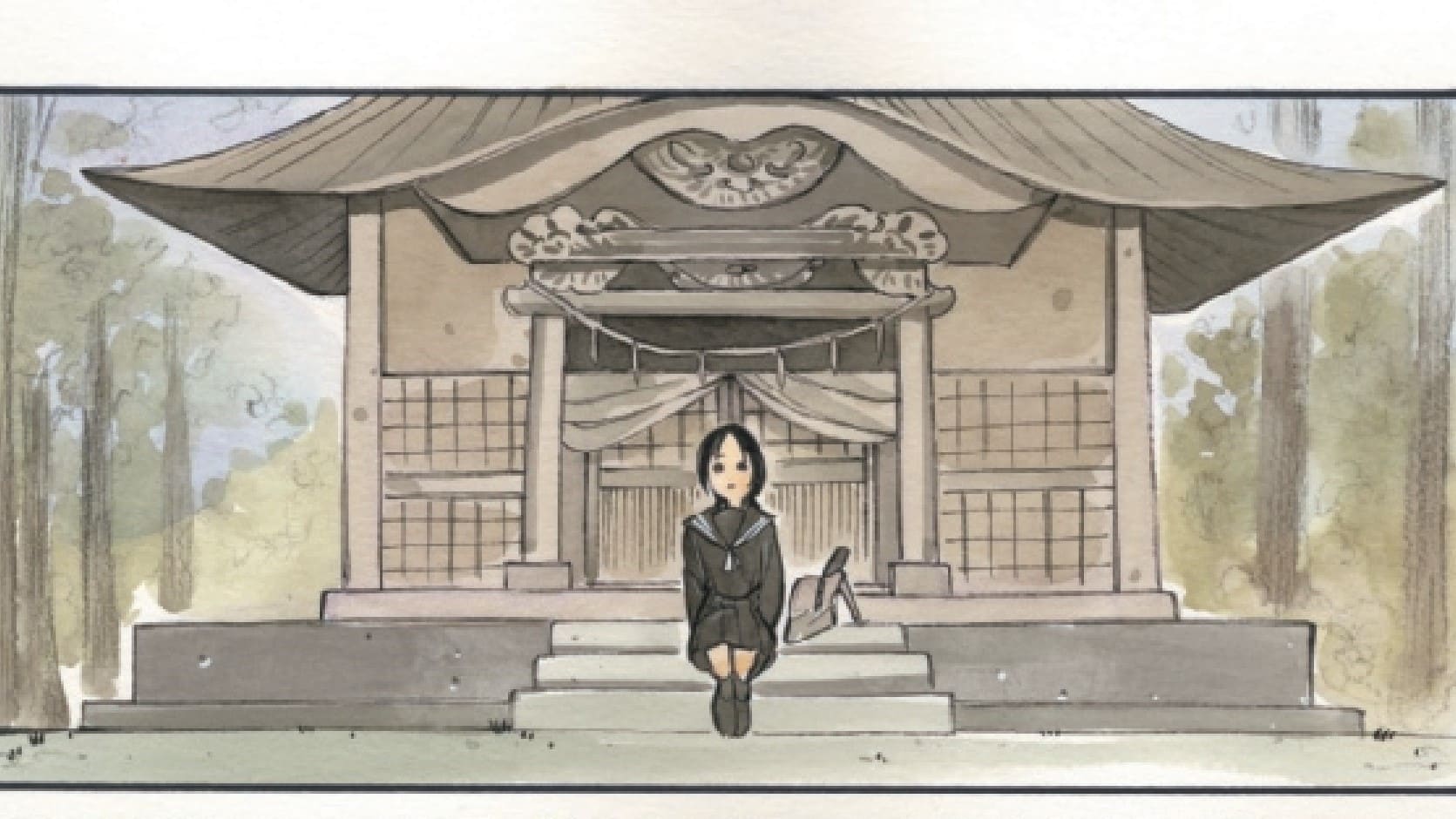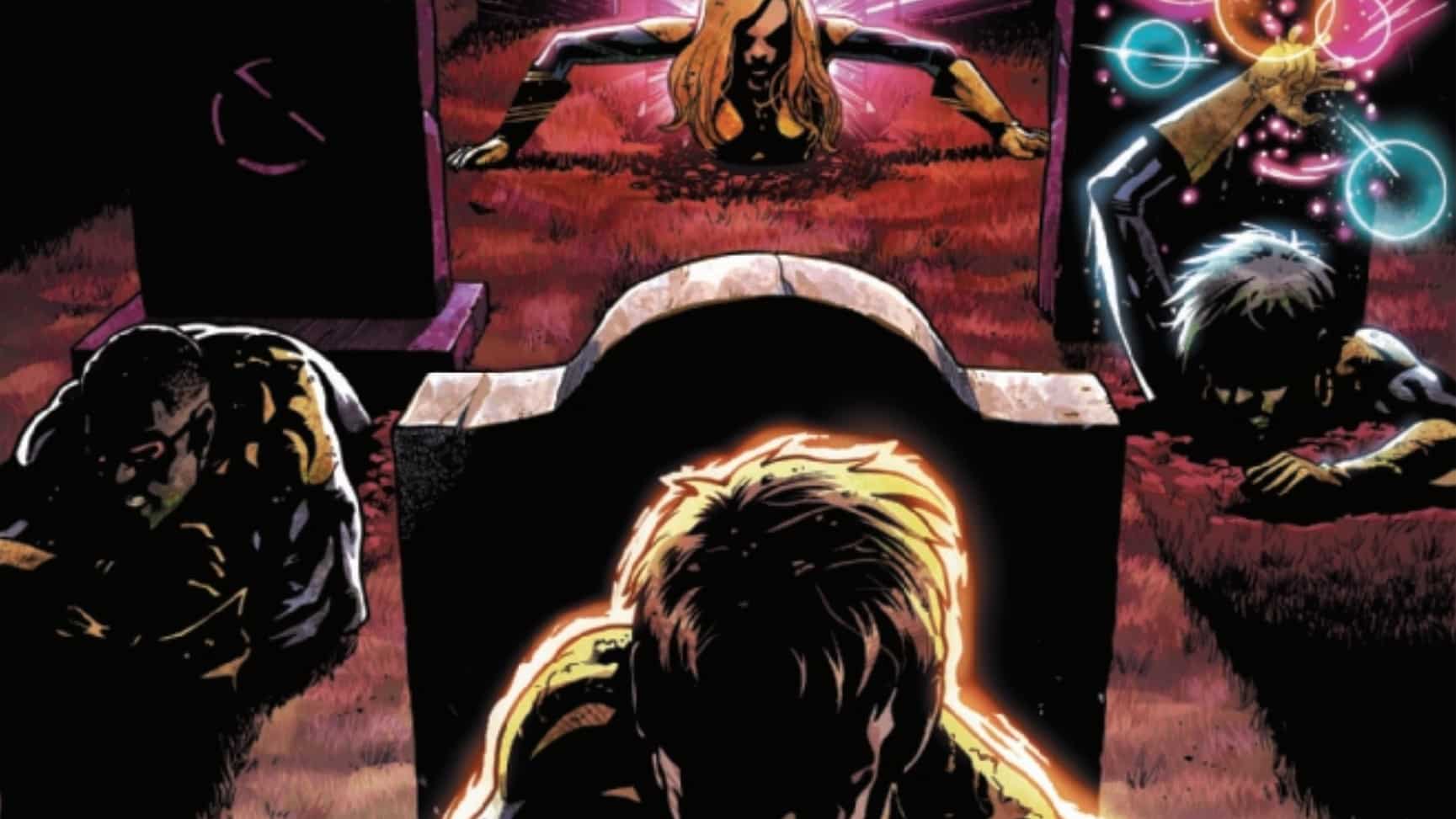Captain Malik and the crew of the Vihaan II escape from their tyrannical government – and chart a course straight to the first living god they can find. But the only thing more dangerous than what lies ahead of them … is who follows behind them. Andrea Ayres and Zach Rabiroff continue their A-to-Z examination of Al Ewing, Simone di Meo, Mariasara Miotti and AndWorld Design’s We Only Find Them When They’re Dead.

Zach Rabiroff: A month has passed since we last checked in with the crew of the Vihaan II, or, as we measure time now in this pandemic year, approximately 3.5 nervous breakdowns on the part of this co-author. So it’s good to be back with you, Andrea, as we accelerate to warp and cross the threshold to find the live gods beyond. Last issue, we were introduced to the odd, thrilling setup of a universe in which the bodies of dead gods are harvested for wealth and the survival of a fading civilization. This time, we take a trip backward for a series of vignettes showing how and why the members of this crew came aboard for this risky mission. Ready to get back onboard the autopsy ship?
Andrea Ayres: I’m always ready to board a ship full of harvested god meat, to be honest. Feels good to bathe in the soothing wash of ambers, blues and pinks. These character vignettes were graciously received, as was the information of how long Malik has been searching for a live god, or at least how long some of the other crew members have known about it anyway. The additional context of these characters’ relationships has caused me to reconsider issue #1. There was a lot of issue #1 to read into, but it’s nice to see how much of that has panned out (or hasn’t).
What’s So Important?

ZR: For my money – and, I would imagine, not just mine – the most surprisingly recontextualized relationship here is between Malik and Jason, here introduced to us in postcoital bliss by way of a jump cut away from the chase scene with which the issue opens. Perhaps I am merely oblivious to such things, and it’s worth conceding that I am still haunted by every painfully obvious flirtation I have managed not to notice over the past two decades. But it’s only now, when the text of their relationship is spelled out in bold letters, that I can see the implications buried behind their interactions back in issue #1: his intense loyalty to the captain, his meaningful glance, and ready acquiescence (“Are we all ready?” “You know I am.”) when Malik asks for his crew to sign off before escaping in search of the gods. And it’s interesting that what we see here actually complicates, rather than simply reaffirms, that loyalty.
In bed with Malik, Jason makes the point that his commitment to the mission isn’t based on their relationship: a child of a younger generation, presumably more removed from any sense of freedom and possibility that Malik may have known as a child, Jason is looking for meaning in the universe for its own sake. But, of course, motivations are rarely as neatly compartmentalized as he would like to believe, and it’s clear (to me, anyway) that Jason’s love for Malik has as much to do with his place on this mission as his own personal quest. Just look at the way Malik casually guilt trips him into signing off on his order at the start of this issue with the knife-twist of, “Please, Jason. I’m asking you as … as a friend.” There’s a tenuous balance here between emotional bonds and lines of authority, and while Malik seems to be aware of them, he’s also perfectly willing to exploit them in a moment of crisis. It’s a troubling dynamic that I can’t imagine is going to get less worrisome as this mission goes on.
AA: Like you, it’s reframed a lot of the relationship dynamics from issue #1. Malik’s conversation with Jason in bed feels kind of paternalizing to me? There’s a manipulative quality to it that I am perhaps reading into his character, but it feels present to me all the same. There’s a saying about motives which I will now butcher that goes something like, don’t just question who someone is writing for but who or what they are writing against. Malik has a definite agenda he wants to push, and that much should be clear to us now. Issue #2 pulls at the thread of the story Malik has weaved for himself and the people aboard the ship. He clearly knows who Jason is, what he wants and how to push all of his buttons. “This should be separate from that. I don’t want you to say ‘yes’ because…” If Malik had any real interest in keeping “this” separate from “that,” he wouldn’t be in bed with Jason in the first place.
That Jason brings up his sister Ella raising him immediately after Malik informs him of his intent to find a living god (and put all their lives at risk) gives us a good deal of insight. Jason is someone who desperately wants to get out from under his sister’s watchful eye. It’s not a small thing to do when siblings take on the role of primary caregiver, it really complicates a relationship in ways I’m sure we will continue to discover.
ZR: If Jason’s conflicting lines of loyalty feel troubling on their own, they get even more knotty once you factor in his relationship with his sister Ella, which we get to glimpse in the issue’s second flashback. If Jason is our crew’s dreamy searcher, drawn both by his love for Malik and by a somewhat nebulous pining to know what lies beyond the void, Ella is all nuts-and-bolts realism and cynical sharp edges. It’s significant that her agreement to go along with this scheme is due both to a desire to protect her little brother and, more damningly, because his actions have already placed her in legal jeopardy. In effect, Malik has set up a chain of both loyalty and blackmail that starts with him and leads all the way down his crew. Ella might be the most reluctant of the bunch, but I’m not sure any of them are fully aware of how much this mission is the product, ultimately, of Malik’s drive first and foremost. They’re all just riding the crest of his wave, whether they realize it or not.
AA: Yep, that’s exactly how I feel. Jason believes he’s made this decision for himself, and that’s what Malik wants him to believe. At the end of that second flashback, after the argument between Jason and Ella where he yells at her, he says, “You don’t have to keep protecting me from what I want!” Her response is “Don’t I?” He’s already left the room, it’s as much a statement to herself as it is a response to Jason. She is left with the weight of having to figure out how to navigate the mess. Ella knows where this mission is heading, and she’s not the least bit surprised when shit goes off the rails at the end of the issue. There’s simply a deep resignation in her facial expression as Malik says, “I’ve probably killed us all…”
Go ask Alice

ZR: Speaking of interlocking loyalties, Alice’s role here seems to be the simplest of the bunch – though, based on this one-page sequence, it’s hard to surmise quite what the nature of her background with the captain is. She obviously takes a kind of motherly role toward Malik, not unlike the place of Ella in Jason’s life. But where Ella tries (apparently without much success) to temper the more unpredictable aspects of Jason’s character, Alice appears to have set herself up as both Malik’s protector and his enabler. Although, maybe it’s not just for Malik, after all Alice’s gleeful eruption after the Vihaan II makes it to warp is certainly, ah, enthusiastic, so maybe Alice is just the kind of crewmember who likes to like things. What did you make of our fleeting glimpse of her here, Andrea? Did you feel like you could draw anything more from her few lines of dialogue than I have?
AA: In the flashback between Alice and Georges we see he still has his eye, which is fun to think about what exactly happened to it between those interceding years. Feels like you’ve got the stoic realism of Ella, the manipulation of Malik, Jason’s desire to feel like an adult, and then we have Alice. She knew where to find Malik after she heard of the news of his family, at the bar. At least that’s the supposition based on her attending to him. She’s someone who may initially come across as simple, but as with anything Ewing-related, it’s not going to be that straightforward.
She’s positive, almost to the point of feeling saccharine, and I’m sure we’ll get to discover exactly why that is. Alice says she’ll “always be here for you. You know that, don’t you? Always. Whatever you need.” The questions that have come up for me are how long has this crew been together, did Malik get to pick his crew? If he did, seems like he picked the people he’d most be able to engender to his cause. Why is Alice so eager to appease Georges? For that matter, why does she seem so eager to please everyone? So many questions.
ZR: Paula Richter continues to be the biggest puzzle among our cast, and that’s clearly something Ewing is setting up by design. Over and over again, the series reminds us of her improbably ubiquitous role in key junctures in Malik’s life: overseeing the death of his parents, assigned to duty when he swears his crew to their secret mission, and new pursuing him into the unknown beyond. She seems, as Malik says, to be an omen: an implacable force of nature like the earth tremors her name evokes. And yet…I just don’t see Ewing as the kind of writer who’s willing to leave things at that. One of his hallmarks as a comic scripter is a universal need to humanize everyone who appears in his stories. Even if Richter is starting this plot as a faceless spirit of pursuit, I have a feeling in my gut that she’s going to end it as more than that. What, after all, is her driving motivation – certainly it seems to be as desperate as Malik’s own, given what she’s willing to give up by following him on his journey. Is she simply the Javert to his Jean Valjean, so committed to the authoritarian rules she serves that she’s given up everything about herself in their name? Or is there something less known to the Vihaan’s crew that might be behind her decisions? I have my unfounded suspicions, but I’m deeply curious to see how it will all develop.
AA: I think there’s something deeply interesting about the final few pages of this issue. When Malik is talking to Richter over comms, he’s trying to get her to not kill them all as they enter into the great unknown. Before hopping onto the channel he indicates that Paula is there to finally kill him at last so you know, obviously some history there. I’m more interested, however, in Jason’s expression as Georges says, “What we’re looking for may not even exist.” By my reading, that’s coming as a surprise to Jason. We can see this in his furrowed brow, the sharp angle of his head which perhaps suggests there was an aggressive turn? As Georges continues, Alice responds “Oh Georges, don’t say that. Even as a lie.” This again reiterates to me that Alice is much more of a keen crewmate than others may give her credit for. Where Malik may assume he’s the chessmaster moving all the pieces, Alice may be up to a game of her own.
Back to Richter, yes, love that you referenced her last name and what it suggests. Which, because my brain doesn’t work, I didn’t even think of. There is determination in Richter’s eyes as she pursues them in the gulf which definitely indicates she’s doing this for more than just a violation of codes and laws. She is driven by a force we have not been privy to yet, but I’m certainly excited to find out. What’s compelling in the back and forth between Georges and Paula (even though she is not responding to his comms) is the way in which Georges uses it as a way to weave the story of who Paula is and her intention. He’s clearly framing her as the villain while trying to make himself look like the flawed but righteous captain. My guess is Paula will have something to say about that, about a lot of things.
Into the Unknown

ZR: So, what to make of all this? Last month’s issue #1 felt like a Wagnerian opera, full of giant ideas and epic universe-building. This one was a nice little ‘70’s singer/songwriter album, all about introspection and inward looks at our core cast. And I think the series made exactly the right call to make this pivot right away. Granted that Di Meo’s art doesn’t exactly shine quite as brightly in these quiet character scenes (his staging is actually pretty strong, but his range of facial acting leaves a little something to be desired, I think). But we needed to understand these people as people if whatever they discover on their journey is going to have significance as drama, and not just as imaginary theology. We’re seeing these gods through the eyes of people we care about now, and it makes the whole story stronger.
That said, I think it’s worth pointing out that even by the standards of a modern indie comic, this series is enormously decompressed. And that’s not a flaw so much as a deliberate strategic choice – one that’s actually surprising to me since I still tend to think of Ewing as a writer overflowing with events and ideas crammed like mad into each issue. But he’s taking his time to let this story build, and while I think that’s probably the right choice (especially considering that most of this series’ lifespan will be in book form), it does make it something of a challenge to see the forest for the trees when looking at individual issues. So maybe the best thing to do is take a deep breath, settle in for another month, and wait to see what’s coming on the other side of warp speed.
AA: I think deep breaths are always warranted. If I could only remember to do that myself…
The vignettes certainly have helped me understand more about who these people are and have been to one another, but as always, I’m left with more questions than answers. That’s what I want out of this series, to be sure. If I’m not pulling at these characters’ personalities and trying to play armchair psychologist using Google Scholar, what am I even doing? what is even the point, damn it? The first issue paints with broad, beautiful strokes. This one adds a few more touches of paint, here and there. We still can’t make anything out though; that of course won’t stop our minds from reading too much into the placement of objects and colors. Di Meo’s art speaks to a part of my soul that still lives in like 1996. It’s a sort of haziness to the color palette which I tend to have a favorable response to. That said, I would love to see some more variation in expression. I think the use of a furrowed brow to demarcate the panoply of human emotions has probably run its course.
One of the ships referenced early on in issue #2 is named Democritus. An ancient Greek philosopher who did NOT see eye-to-eye with Aristotle. At any rate, one of the quotes attributed to him says “Nothing exists except atoms and empty space; everything else is opinion.” I think that’s important to keep in mind as We Only Find Them When They’re Dead progresses.
TAKE THE 2021 XAVIER FILES COMICS SURVEY

